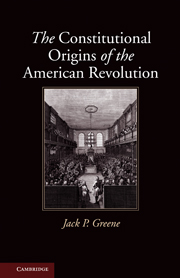2 - Empire confronted, 1764–1766
Published online by Cambridge University Press: 05 June 2012
Summary
At the conclusion of the Seven Years’ War in 1763, the only certainty about constitutional arrangements within the large, extended polity that constituted the early modern British Empire was their uncertainty. The balance of authority between metropolis and colonies remained undefined. Recurrent disputes over the extent of the Crown’s colonial authority had left that issue unresolved, and the nature of Parliament’s relation to the colonies had never been explicitly examined. As Massachusetts Governor Francis Bernard remarked in August 1764, the relationship of the “Subordinate Governments … to the Sovereign power” had “never been formally settled” and was certainly not “generally understood.”
Parliament’s efforts to impose taxes on the colonies in the mid-1760s precipitated the first intensive and systematic exploration of this problem on either side of the Atlantic. Ostensibly, the issue raised by these efforts, especially by the Stamp Act of 1765, was no more than whether, in the succinct words of Bernard, “America shall or shall not be Subject to the Legislature of Great Britain.” But the controversy rapidly moved on to a more general level. In the process, it provoked a broad-ranging consideration of fundamental issues involving the nature of the constitutional relationship between Britain and the colonies and the distribution of power within the empire. Far from producing either a theoretical or a practical resolution of these issues, however, the Stamp Act crisis of 1764–6 revealed a deep rift in understanding between the colonies and metropolis that would never be bridged within the structure of the empire.
- Type
- Chapter
- Information
- The Constitutional Origins of the American Revolution , pp. 67 - 103Publisher: Cambridge University PressPrint publication year: 2010
References
- 1
- Cited by

